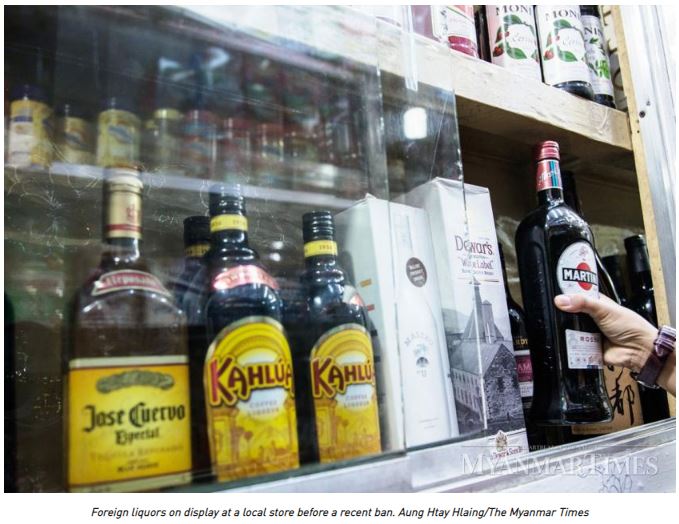Myanmar: Confusion emerges after foreign liquor ban
At a liquor store in downtown Yangon, bottles of whisky and wine are on display. Upon closer inspection, one soon notices that wines from Argentina to New Zealand are for sale, but only whiskies made locally are available.
“Foreign liquors are not on display because we are not allowed to sell them,” the sales assistant at the store tells one customer. “But we can still get you the imported liquors if you want it,” she added in a hushed tone.
There have been similar cases all over Yangon since the city’s Food and Drug Administration, Internal Revenue Department, Department of Consumer Affairs, and Department of Trade told liquor retailers and wholesalers in the city in September that they would no longer be allowed to sell imported liquor.
Confusion lingers
But traders and some government officials are still confused as the ban contradicts a separate regulation by the Ministry of Home Affairs, which issues the FL-12 licence allowing retailers to sell any kind of imported alcohol. This has been the practice since the colonial era, said U Thein Zaw Oo, administrator of Karmayut Township, Yangon.
Yet, the Special Commodity Tax Law prohibits the import and sale of foreign liquor, beer and cigarettes. In 2015, the Ministry of Commerce (MOC) lifted the ban on imported wine, but liquors and beers remain illegal.
“This has been the case for years and no one can say they do not know it is prohibited by the law,” U Khin Maung Lwin, deputy permanent secretary of the MOC, told The Myanmar Times.
“Only airport duty-free shops and some hotels are permitted to sell imported liquor and these are targeted at foreign visitors. But distributing and selling domestically is illegal and we will take action,” he said. The punishment for retailers found with the goods is three years in prison and confiscation of the goods.
However, U Thein Zaw Oo said, up until 2013, the General Administration Department had continued to issue FL-12 licenses. According to the department, prior to 2013, more than 2000 FL-12 licenses were issued in Yangon Region each year, bringing in around K3.4billion in fees annually. The department stopped issuing the licenses after a surge in applications in 2013.
Meanwhile, taxes are also collected for the liquor at the point of sale. “That is why some liquor retailers have openly sold imported whiskies before. FL actually stands for foreign liquor, so it’s quite confusing,” he said.
Law enforcement
As it is stipulated under the law though, the MOC’s enforcing of the imported liquor ban is expected to take precedence over the licences.
U Myint Cho, director of Consumer Affairs in Yangon, said the impetus for enforcing the ban is complaints from domestic producers about the sale of illegally imported liquors at local stores.
The move spearheads a much needed crackdown on illegal foreign liquor imports. “Illegally imported alcohol costs the government lost tax revenue and can endanger public health,” he said during a meeting with liquor retailers last month. Because illegal liquors escape tax, they are also sold at lower prices, which undermines local producers.
“We will investigate how larger quantities are entering the country,” he said, adding that the authorities will charge those found selling imported liquors.
Notably, since the department stopped issuing FL-12 licences, a black market for them has emerged. “Since we stopped issuing the licence, people have been paying large amounts for them on the black market. According to retailers, the fee for an official FL-12 licence in the past used to be K1.5 million. Now though, licence holders are asking for as much as K10 million for them, depending on the location.
FL-12 licences are most sought after by bar owners and hoteliers. According to the Ministry of Hotel and Tourism, only 168 hotels out of the 1500 hotels that have since opened in Myanmar have liquor licences.
However, there is not data on which hotels have received the licences to import and sell foreign liquor, U Myo Win Nyut, director of Ministry of Hotel and Tourism told The Myanmar Times.
No charges yet
Since the changes though, no one has yet been charged. “There has been no instruction for township-level administration departments, which collect taxes and ensure the rules are followed, to cooperate on the matter,” U Thein Zaw Oo said.
For its part, the MOC is now discussing plans with the Hotel and Tourism, Home Affairs and Planning and Finance ministries to conduct joint checks and inspections on illegal liquor imports, distribution and sales, U Khin Maung Lwin said.
In the meantime, liquor retailers have started to fight back. “The government can get high volumes of tax revenues and licence fees from restaurants, bars and night clubs so they should reconsider this issue,” said U Kaung Min Khant, a bar and restaurant owner.
U Maung Lone, a liquor retailer who has been operating a liquor store with an FL-12 licence since 1996, said the government is enforcing the law against imported liquors now to protect local liquor producers.
“That shouldn’t be the case in a democratic country. Market supply and demand shouldn’t be the government’s business. Their focus should be on collecting taxes. I pay nearly K10 million a year in taxes,” he said. “All we want is to proper permission to sell foreign alcohol.”
Source: https://www.mmtimes.com/news/confusion-emerges-after-foreign-liquor-ban.html


 Thailand
Thailand




